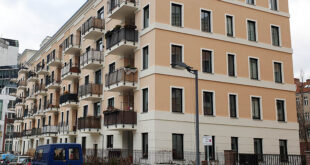Two thirds of women in women’s shelters (Frauenhäusern) in Germany have a migration background, according to a recent survey. Some of the reasons why women seek protection in such homes, commonly called refuge for battered women, include domestic violence and lack of money to rent their own accommodation.
According to the statistics of the Women’s Shelter Coordination (Frauenhauskoordinierung) presented in Berlin on Tuesday, 7,045 adults and 8,134 children lived in the 182 women’s shelters nationwide in 2019.
Domestic violence is experienced by women of all ages, income and education levels and ethnic origins, but “particularly vulnerable groups with limited financial or social resources seek the support of women’s shelters,” the executive director of the umbrella organisation of women’s shelters in Germany, Heike Herold, explained.
Of the residents of women’s shelters in the country, 16 percent came from EU countries and another 26 percent from non-EU European countries. Seventeen per cent of the women were born in Africa and 38 per cent in Asia, the survey reports. The ten most common countries of origin of the women with a migration background are Syria, Turkey, Afghanistan, Iraq, Russia, Poland, Kosovo, Morocco, Serbia and Romania. About half of the women with their own migration history came from these countries.
Ms Herold explains that the statistics do not allow any direct conclusions to be drawn about the distribution of the origin of the perpetrators. An important role here is that women of foreign countries of origin are regularly more dependent on the protection of women’s shelters. In many cases, the reason is that these women do not have the same social networks and resources for alternative options as Germans.
“In addition, there is discrimination in the housing market, which makes their search for housing (even after staying at the women’s shelter) particularly difficult,” she reported.
According to the survey, women without a permanent residence permit of their own also face special risks and challenges. In Germany, they have to observe the legally prescribed three-year period of marriage before they are entitled to a residency right independent of their spouse. This places them in great dependence on their partner, which makes it difficult for them to break away from a violent relationship.
The majority of the residents have many and complex counselling needs. “However, we know from practical experience that there are often hardly any funds available for appropriate services such as language mediation, childcare or support for the women,” said Herold.
Moreover, almost half of those affected have to finance their stay in women’s shelters partially or completely themselves. The association of women’s shelters therefore advocates for a nationwide legal entitlement to protection and help in cases of violence and a uniform, sufficient financing of the support system.
In European countries, a women’s shelter is a social institution that offers women and their children help, counselling and temporary shelter in the event of domestic violence. The support hotline for the victims’ of violence against women in Germany is 08000 116 016.
Vivian Asamoah
READ ALSO Violence against women is not just a buzzword by Dr Herzberger-Fofana
 THE AFRICAN COURIER. Reporting Africa and its Diaspora! The African Courier is an international magazine published in Germany to report on Africa and the Diaspora African experience. The first issue of the bimonthly magazine appeared on the newsstands on 15 February 1998. The African Courier is a communication forum for European-African political, economic and cultural exchanges, and a voice for Africa in Europe.
THE AFRICAN COURIER. Reporting Africa and its Diaspora! The African Courier is an international magazine published in Germany to report on Africa and the Diaspora African experience. The first issue of the bimonthly magazine appeared on the newsstands on 15 February 1998. The African Courier is a communication forum for European-African political, economic and cultural exchanges, and a voice for Africa in Europe.




































